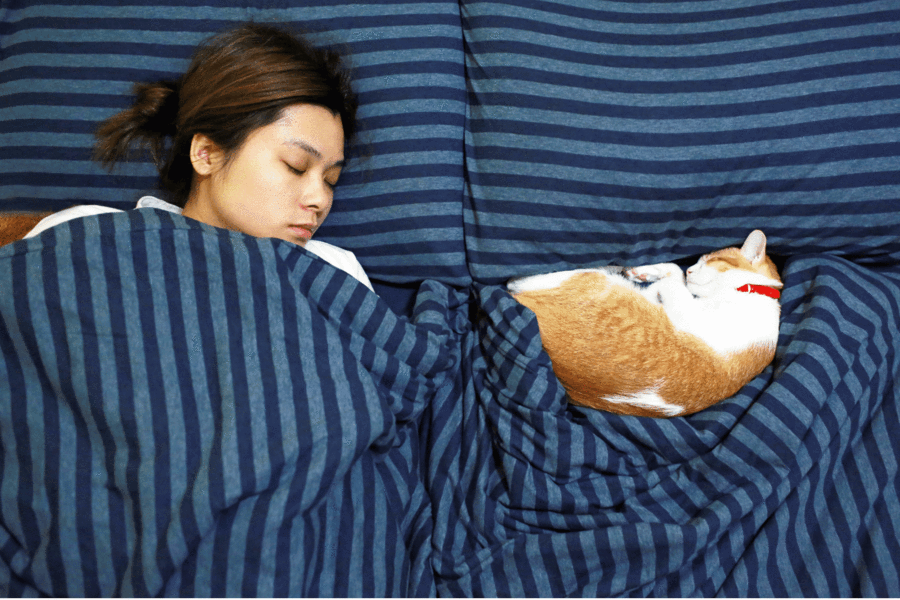You know you’ve had a good night’s sleep when you wake up and your brain feels refreshed. How to achieve it? I have struggled with a pattern of getting less and less restorative sleep over the years even though I’m caffeine free. Thankfully, I’ve discovered some helpful tricks that promote really deep, restful sleep and I’d like to share them with you!

Why can’t we achieve deep sleep?
First, you should understand that the reason your body doesn’t sleep deeply enough is because too much cortisol is being produced by your adrenal glands at the wrong time of the day. Cortisol is our wake-up hormone and we really only want it between 6 to 8AM when it’s time to get up.
Coffee drinkers spike their cortisol with caffeine, which is why many grumpy people are standing in line at Starbucks before they go to work! Their adrenals aren’t performing well without that habitual caffeine jolt and thus they’re irritable until they get it.
Controlling cortisol levels and not having it interfere with sleep is the goal. Thus, the advice is typically to avoid caffeine after 3PM. Unfortunately, many of us are more sensitive to caffeine and even a morning cup of coffee can still be affecting our sleep 18 hours later. Those people who drink coffee after dinner and still go right to sleep probably aren’t reaching that stage four deep sleep where our bodies and our brains are truly restored. As a result, they need a cup of coffee as soon as they wake up.
The average 50-year-old has nighttime cortisol levels more than 30 times higher than the average 30-year-old. As the body ages, cortisol production increases as DHEA, our rebuild and repair hormone, decreases. Think of cortisol and DHEA as being on opposite ends of a seesaw in our adrenal glands. At midlife, we first feel our aging bodies start to complain as DHEA production falls, cortisol rises, and suddenly, we no longer have the same energy or endurance we once took for granted.
When we experience enough stage 4 sleep, it feels so delicious! We are calm and feel an equanimity that gives us the ability to face whatever the day brings. I’ve been searching for a way to get that deep sleep every night. Supplements like melatonin, calcium and magnesium help because they override the cortisol. But often, they work for a while and then their effect wears off as our bodies become accustomed to them. The key is to have a variety of ways to mitigate the effects of too much cortisol. From figuring out how to stop it from being produced at the wrong time of the day, to counteracting elevated cortisol levels caused by daily stress and our aging bodies, here are six ways to reduce cortisol and promote deep sleep at night.
.jpg?v=1666731753004)
6 Ways to Deepen and Prolong Your Sleep
- Be caffeine free – all day long! That is the first and most important step towards getting off the rollercoaster of energy highs and lows that alter your body’s circadian rhythm (the body’s internal clock for night and day). By being caffeine free, you’ll allow your adrenal glands to function normally without interference from stimulants. Watch out for desserts after dinner that contain either chocolate or coffee flavor – both can stimulate your adrenals to prevent sleep or wake you up later in the middle of the night.
- Rotate nutritional nightcaps that help prolong and deepen your sleep: Here are a number of supplements you can take before going to sleep that help prolong and deepen your sleep:
- Melatonin: This is the hormone that your body naturally produces at night to put you to sleep. It is the opposite of cortisol which is the stimulating hormone that wakes you up in the morning. My favorite brand is Source Naturals Sublingual Orange which dissolves in your mouth. Take 2.5-5 mg of sublingual or time release tablets right before sleep. Some 30% of people don’t have a good reaction to supplemental melatonin so you’ll have to see if it’s effective for you or not.
- Magnesium citrate: Magnesium is depleted by stress and caffeine as well as various digestive issues and prescription drugs. If I’m waking up at night with thoughts racing through my mind, I find that drinking magnesium before bedtime breaks the cycle. My favorite brand is Calm, which is an effervescent powder that comes in several flavors and can be found in natural foods stores and on the internet. 350mg powder dissolved in water is the optimal dosage.
- Lemon balm tea: There’s nothing more soothing than a cup of fragrant lemon balm tea at bedtime. Lemon balm soothes your stress and deepens your sleep. I like to drink half of my cup before going to sleep and if I wake up in the middle of the night, I’ll have the rest of the cup sitting on my bedside table waiting to help me drift back to sleep. Teeccino Mango Lemon Balm is my favorite nightcap!
- CBD drops: Lots of people swear that a few drops of CBD extract placed under their tongue helps them fall asleep or gets them right back to sleep. My advice is to experiment with a few different brands to find the one that is effective for you, because there is a lot of variation between brands. Some people like CBD combined with a low dose of THC too – but check to make sure it’s legal in your state! Between 5-10mg of CBD should be an effective dose.
-
Deep breathing: When you’re trying to drift off to sleep, consecutive deep belly breaths will help your mind focus on your breathing while counting each slow breath to keep other thoughts from intruding. I like to begin with several breaths where I fully exhale until there is no air left in my lungs, compressing your stomach muscles with your hand on your belly to fully exhale all your air is a great way to begin a series of deep breathing. Then follow them with slow, deep breaths. If you get off track with thoughts, start again and count each slow inhale and exhale as one breath from the beginning. I usually can fall asleep by the time I’ve gotten to twenty breaths, but it may take a couple of attempts to get all the way to twenty. It’s amazing how interruptive our minds can be!
-
Hot baths to relax muscle tension: Many people find a soak in a hot bath or hot tub will relax them to fall asleep quickly and easily. There’s actual science behind it. If you soak for at least 10 minutes in water with a temperature between 104 and 109 degrees, your body temperature will actually decrease as your blood is moved from your core to your extremities such as your hands and feet. That lower body temperature signals the pineal gland to produce melatonin. Hot baths 1-2 hours (ideally 90 minutes) before sleep have been shown to increase the speed of falling asleep by 10 minutes.
-
Reading: The object is to tire your brain. What you read and how you light the page are key. First, pick a non-fiction book with lots of information in it. No fiction or political subjects that can evoke emotional responses. I like to read books about herbs, history or spiritual philosophy. Reading with a small book light that clips onto the back of your book and only lights your page will encourage your brain to go to sleep. Your circadian rhythm is regulated by light, so you don’t want your room to be lit up while you read or you’ll discourage the production of melatonin. Your brain will tire out from the dense reading material and then it’s easy to switch off the light and fall asleep.
-
Massage: One of the most effective ways to stop my mind from thoughts that keep me awake is repetitive, slow massage strokes. They can be concentrated in one area like the lower back. The repetition will pull my attention to the area of the body being massaged and stop whatever my mind was going on about. If you have one of those partners who can fall asleep at will (how annoying, right?), ask them to massage a small area repetitively for about 10 minutes. Focus on the strokes and how good they feel. Soon your breath will slow and you’ll drift off to sleep.


